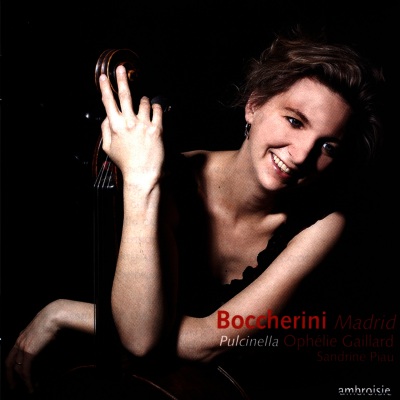
Boccherini: Madrid
Luigi Boccherini spent the bulk of his life in Spain, and although he at one point held the position of court composer for Friedrich Wilhelm of Prussia, he exercised those compositional duties in absentia. It was in Madrid that he wrote the majority of the works for which he is remembered. He was one of the great cello virtuosi of all time, and in this album, cellist Ophélie Gaillard leads the chamber ensemble Pulcinella in a spirited romp through a selection of his works. What is most immediately striking about these performances is the sense of delight and gleeful abandon that the performers bring to these pieces. Even the concert aria "Se d'un amor tiranno," with a text, which, on paper, looks like a lament for lost love, sounds for all the world in Boccherini's setting and in this exuberant performance, like a playful cajoling, with the singer having every confidence of winning back a straying lover. The opening selection sets the tone for and establishes the expectation that this is music whose intent, at least in part, is to make you smile -- and you can hear the smile in the players' performances. The arrangement of the Fandango from the composer's Quintet for guitar and strings is for string quartet, two guitars, percussion, and castanets, and it's a wild ride that may play a little loosely with the score, but which certainly is true to its rambunctious spirit. (Boccherini's original does actually include the castanets.) This version includes a break in which the guitars improvise over an ostinato, but its sensuality is so true to the rest of the piece that it dispels any quibbles over absolute fidelity to authentic performance practice. Likewise, Gaillard's audacious decision to turn the cadenza of the final movement of the G major Concerto into variations on Mozart's "Se vuol ballare," from The Marriage of Figaro (an opera that includes its own fandango later in the score), written 16 years after the concerto, sounds entirely fitting. Her performance throughout is bubbling with abandon, but is technically immaculate; her playing may sometimes border on wildness, but she is always fully in control. Soprano Sandrine Piau sings with radiance, purity, and playfulness. Pulcinella matches the soloists in the musicality and exuberance of its performances. Ambroisie's sound is appropriately bright, full, and realistic. Highly recommended. The release includes a DVD with two documentaries in French, with English subtitles, about the making of the CD. In "Neiges éternelles," Gaillard talks about Boccherini's life and music with charming and infectious enthusiasm, and Pulcinella plays excerpts from several works, including some that aren't on the CD. "Parfums de Madrid" features the recording session for the Fandango, including the marvelous improvisation in the middle of the piece, which, Gaillard assures us, is based on the loopiness of the score and her understanding of Boccherini's personality.
